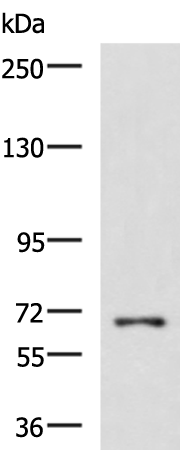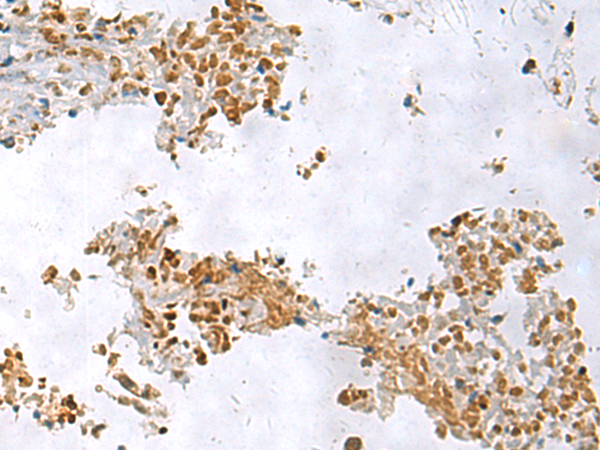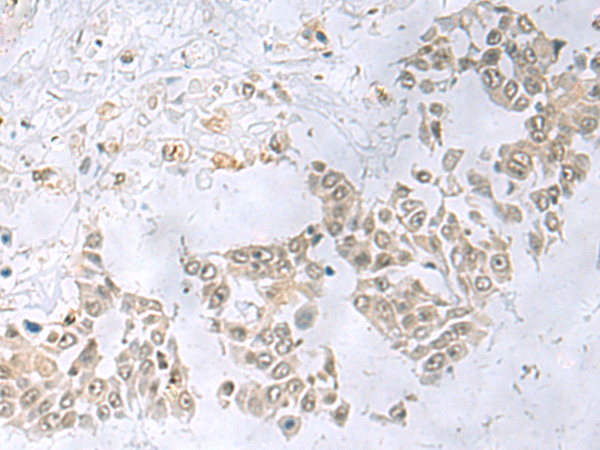


| WB | 咨询技术 | Human,Mouse,Rat |
| IF | 咨询技术 | Human,Mouse,Rat |
| IHC | 1/25-1/50 | Human,Mouse,Rat |
| ICC | 技术咨询 | Human,Mouse,Rat |
| FCM | 咨询技术 | Human,Mouse,Rat |
| Elisa | 1/5000-1/10000 | Human,Mouse,Rat |
| Aliases | FBP; FUBP; hDH V |
| WB Predicted band size | 68 kDa |
| Host/Isotype | Rabbit IgG |
| Antibody Type | Primary antibody |
| Storage | Store at 4°C short term. Aliquot and store at -20°C long term. Avoid freeze/thaw cycles. |
| Species Reactivity | Human, Mouse, Rat |
| Immunogen | Synthetic peptide of human FUBP1 |
| Formulation | Purified antibody in PBS with 0.05% sodium azide and 50% glycerol. |
+ +
以下是3篇涉及FUBP1抗体的研究文献摘要信息:
---
1. **文献名称**:*FUBP1 interacts with c-Myc to regulate DNA damage repair in glioblastoma*
**作者**:Wang X, et al.
**摘要**:本研究利用FUBP1特异性抗体进行免疫共沉淀(Co-IP)和染色质免疫沉淀(ChIP),发现FUBP1与c-Myc结合,通过调控DNA损伤修复相关基因(如BRCA1)促进胶质母细胞瘤的放疗抵抗。
---
2. **文献名称**:*Far upstream element-binding protein 1 regulates HCC metastasis via NLRP3 inflammasome activation*
**作者**:Chen L, et al.
**摘要**:通过Western blot和免疫组化(IHC)分析肝癌组织,发现FUBP1抗体检测到的高表达FUBP1与NLRP3炎症小体活化相关,促进肝癌细胞侵袭转移,提示其作为预后标志物的潜力。
---
3. **文献名称**:*FUBP1 is a novel mediator of oncogenic MAPK signaling in lung adenocarcinoma*
**作者**:Zhang Y, et al.
**摘要**:研究使用FUBP1抗体进行蛋白质互作实验,揭示FUBP1通过结合RAS/MAPK通路成分增强肺癌细胞增殖,靶向抑制FUBP1可降低小鼠模型中肿瘤生长。
---
4. **文献名称**:*Loss of FUBP1 disrupts neuronal differentiation in neuroblastoma*
**作者**:Tanaka R, et al.
**摘要**:通过shRNA敲低和FUBP1抗体验证,发现FUBP1缺失导致神经母细胞瘤分化阻滞,其机制与MYCN信号抑制和p53通路激活有关。
---
以上文献均通过FUBP1抗体验证其在肿瘤中的功能,涵盖机制研究、诊断及治疗靶点探索。如需具体期刊或年份可进一步补充。
The Far Upstream Element-Binding Protein 1 (FUBP1) is a multifunctional DNA/RNA-binding protein involved in transcriptional and post-transcriptional regulation. It binds to the far upstream element (FUSE) of target genes, such as the proto-oncogene MYC, to modulate their expression by unwinding DNA or RNA secondary structures. FUBP1 plays critical roles in cell cycle progression, proliferation, and differentiation. Dysregulation of FUBP1 is linked to various cancers, including gliomas, hepatocellular carcinoma, and lung cancer, where its overexpression or mutation often correlates with tumor aggressiveness and poor prognosis.
FUBP1 antibodies are essential tools for studying its function and mechanisms in both normal and pathological states. These antibodies are widely used in techniques like Western blotting, immunoprecipitation, and immunofluorescence to detect FUBP1 expression levels, subcellular localization, and interaction partners. Researchers also utilize FUBP1 antibodies to explore its role in oncogenesis, particularly its interplay with MYC and other oncogenic pathways. Structural studies using these antibodies have helped map functional domains, such as its KH domains responsible for nucleic acid binding. Additionally, FUBP1 antibodies contribute to biomarker discovery and therapeutic targeting strategies in cancer research. Validation of specificity through knockout controls or siRNA knockdown remains crucial due to potential cross-reactivity with homologous proteins like FUBP2/3.
×